
What No One Told You About Calcium
Calcium is a vital mineral that humans and animals need to survive. It plays a major role in some important body functions other than maintaining healthy bones and teeth. It also aids in muscle movement and brain function.
Probiotics are living organisms, often found in food and drinks, that support general health. When used with other vitamins and minerals like calcium, probiotics can improve their absorbability and enhance their health properties.
Calcium and probiotics are important for the body and should be included in a healthy and balanced diet.
Calcium and Probiotics for Health
Recent findings in animal models suggested the association and interference of probiotics in calcium intake and absorption. Fermented dairy products may slightly decrease bone loss and improve the calcium balance.
Calcium
The body needs calcium primarily to maintain bone density and prevent osteoporosis. The bones become brittle as people age and get destroyed faster than they are being formed. Menopause in women can accelerate bone loss as the estrogen, which promotes bone formation, decreases.
Calcium is also responsible for the following key functions:
- Building strong teeth
- Muscle contraction and relaxation
- Nerve signal transmission
- Release of hormones and other chemicals
- Stimulation of enzymes
- Normal heartbeat
- Support colon health
Probiotics
Probiotics are beneficial bacteria in food and supplements that help keep the gut healthy. Your body does not necessarily need probiotics since the gut already has a host of healthy bacteria.
The problem is that good bacteria may get depleted because of gut problems, unhealthy food and lifestyle, or antibiotic use. That is why experts suggest including probiotic-rich food in the diet to improve the gut microbiota.
Studies also revealed the benefit of probiotics and isoflavones in bone health by regulating calcium uptake and various metabolic pathways.
Probiotics are beneficial, however, the supplements out there are all lab-made. This means they aren’t 100% natural, they may contain chemicals and other compounds that damage your liver while helping your gut. What you could do is follow the traditional way of doing things and prepare everything by yourself.
That’s what experienced herbalists do, and that’s why they have become so famous for thriving without most of the things in a pharmacy. I couldn’t believe my eyes when I saw a video of the remedies they have been using for ages and still work today. I’ll just leave a link here for you to check it out.
When to Take Calcium and Probiotics
The adult body cannot produce calcium and probiotics on its own. They are only acquired from diets such as yogurt, kefir, cultured buttermilk, miso, tempeh, and other fermented foods.
Non-dairy calcium sources include soy milk, almonds, dried figs, tofu, chia seeds, or sunflower seeds.
Calcium and probiotics are important but should be taken in moderation. Supplementation is not necessary unless:
Presence of Dietary Insufficiency
If you believe you consume enough calcium and probiotics from food, you do not need to take supplements. Aside from dairy and fermented foods, you can also get these from leafy green vegetables and fortified foods.
Cooked kale, spinach, collard greens and other leafy greens contain calcium. They are also sources of probiotics that can help feed the gut microbiota.
If you have limited access to calcium and probiotics and are not meeting the dietary requirement, you may need to consider taking supplements.
Dietary Challenges
Calcium and probiotics supplements are necessary for people with specific dietary requirements due to a health condition. People with lactose intolerance or following a vegan diet may also need supplementation tailored to their particular needs.
People consuming a large amount of sodium and protein excrete more calcium. It may also cause an imbalance in the gut microflora and a shift in its composition. Eating a calcium and probiotic-rich diet and taking supplements may rectify the loss and imbalances.
Specific Health Concern
If you have bone issues like osteoporosis, a female in her menopausal stage, or suffering from gut problems, you may need to take calcium and probiotics. People with bowel and digestive issues such as inflammatory bowel disease or celiac disease must increase their calcium/probiotic intake. A healthcare professional is the right person to recommend supplementation based on the present condition.
Managing such gut conditions is hard, especially when getting quality food becomes harder. I’m trying my best to stay away from too many pills and antibiotics… it’s just my personal choice. What I do instead is follow a simple set of rules depending on which health problem I want to manage.
For instance, I finally got rid of the burns I felt in my chest due to Acid Reflux by learning what triggers to avoid, and what to do to aid my stomach instead. It’s the same with any health concern I may have. This Guide really helped me out. Check out its table of contents here to see if you need it!
Persistent Gut Problem
Hyperacidity and diseases that compromise the mucosal integrity of the small intestine can impact calcium absorption. Recurring gastrointestinal problems can affect digestive function and hamper the absorption of other nutrients.
Calcium carbonate, an ingredient in some antacids, may also relieve upset stomach, indigestion, and heartburn. Calcium and calcium carbonate promote the adhesion of gut bacteria to intestinal cells to maintain the gut microflora and metabolic activities.
If your gut discomfort persists you shouldn’t wait until it’s too late. Any pain or feeling of an unwell digestive tract can be a symptom of something greater. That’s why you should know which herbs are gut remedies and try to incorporate them into your daily routine. Here’s the blend I use to treat my gut right.
Showing Symptoms of a Deficiency
Chronic fatigue, sleep problems, cognitive issues, depression and skin problems are general symptoms of a health problem. Muscle cramping and twitching, brittle nails, cavities and arrhythmia may occur if you lack calcium.
Bad gut health may cause sugar cravings, aching joints and weight changes. These and other frequent health issues and illnesses may indicate the need to take more calcium and probiotics.
When Calcium/Probiotics Should Not Be Taken
There are instances where calcium and probiotics are contraindicated at the discretion of a healthcare professional or dietician.
Taking too much probiotics may not cause harmful side effects other than bloating and upset stomach. However, it is not advisable for these groups of people:
- Severely immunocompromised
- Have pancreatitis
- Have blood in their feces (melena)
- Have short bowel syndrome
- Have central venous catheters
- Those in the ICU
- Have open wounds after a major surgery
Likewise, the doctor may determine the necessity of a calcium supplement. They may not be advisable for:
- Hypercalcemia (excessive calcium in the blood)
- Existing heart diseases
- Prostate cancer
- Kidney disorders
- Stroke
Homemade Calcium and Probiotic Kefir Recipe
Kefir is a nutrient-dense fermented milk widely known in the natural health community. It is more nutritious than yogurt and may influence health in many ways.
A cup of kefir can provide 24% of the daily value (DV) of calcium and is a potent source of probiotics. It is especially beneficial in preventing the risk of osteoporosis, boosting digestion, managing weight and supporting mental health.
Kefir can be found in many grocery and health stores, often in the dairy section.
You may also make your own kefir at home, which is relatively cheaper but as potent as commercial products.
 What You Will Need
What You Will Need
- Glass jar
- Breathable cloth or paper towel
- Rubber band
- Sieve
- Storage jar
- ½ tsp kefir grains
- 2 cups milk
- Balanced Gut Tincture (20 drops per cup)
Steps
- Put the kefir in a glass jar.

- Add the milk, leaving about 2 cm headroom from the top.

- Cover with the cloth and secure with a rubber band. Set aside at room temperature for at least 18 hours or until the milk has thickened and separated. You may notice pockets of whey forming but these are a normal part of the process.

- Strain and transfer into a jug or bottle.

Add the tincture drops once it’s done. Serve it immediately or leave it at room temperature for a few hours if you want a stronger flavor. Store it in the fridge and consume it within 7 to 10 days.
If you want to enhance the flavor, you can add a slice of lemon, or couple drops of lemon oil into the kefir after straining.
Plant-based milk may also be used to make kefir. Oats and coconut milk are the best options, but they need to contain at least 3.5g sugar per 100 ml to serve as food for the bacteria.
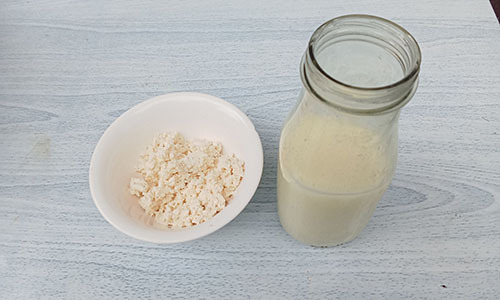
To Use: Gradually introduce kefir into the body by taking a couple of teaspoons. You may experience digestive symptoms at the start, but it may subside over the week. Once your stomach is accustomed to it, take 1 cup of kefir daily with a healthy and balanced diet.
There is no recommended dosage for kefir, but 2 cups daily may be safe for up to 4 weeks. Lower doses at half a cup may be safe for consumption for up to 12 weeks.

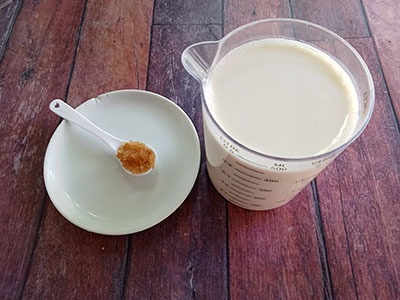 What You Will Need
What You Will Need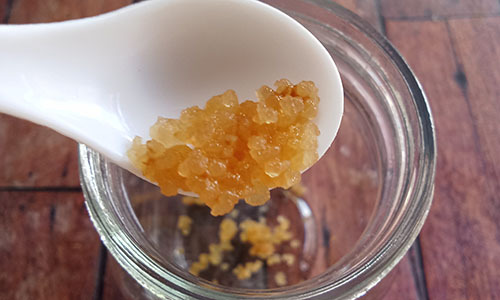
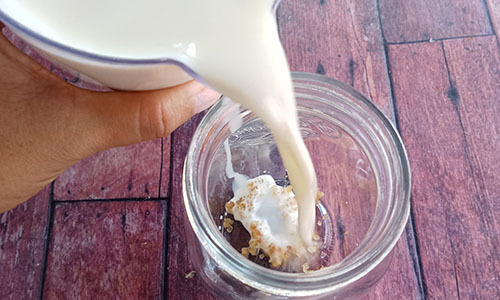
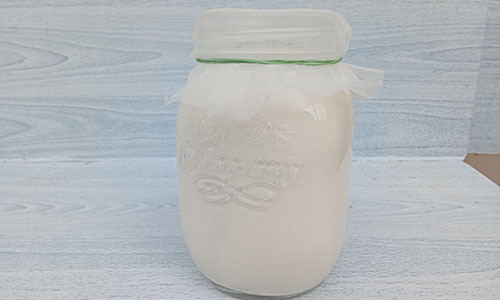
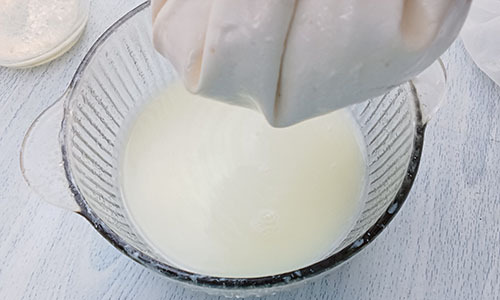
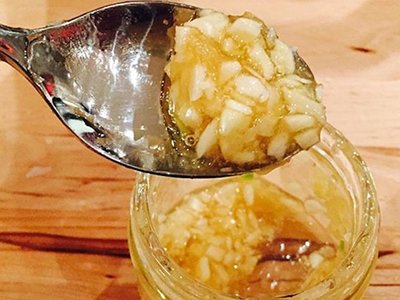
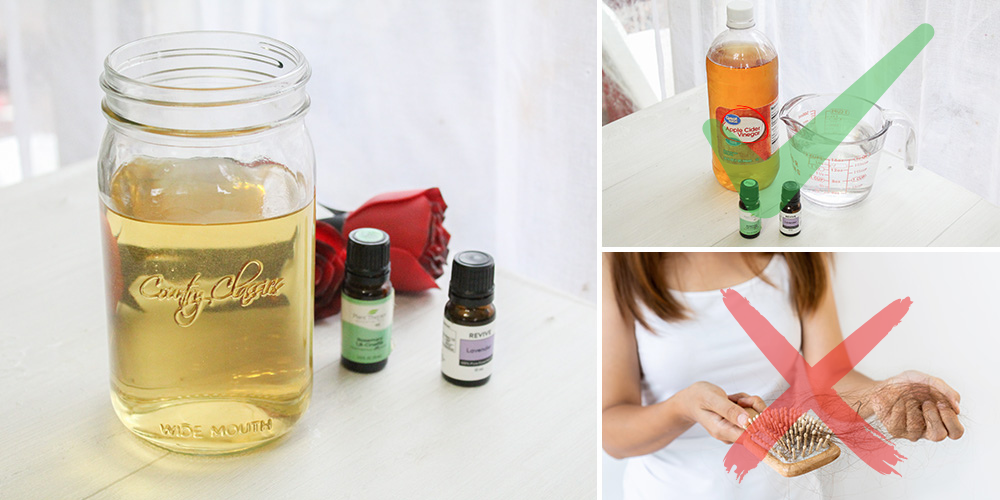


Hello Nicole,
I want to join the academy but I don’t want to fo digital books. I would like to be able to have live classes with you with real paper books.. maybe you could do like a weekend retreat where you walk us through a trail and show us how to prepare remedies.
Please let me know if we could do that.
How do I do much of any of it. I am allergic to most everything. Greens, dairy, etc
Kindly get your information correct. First you use water kefir in the milk and out comes kefir grains for milk???